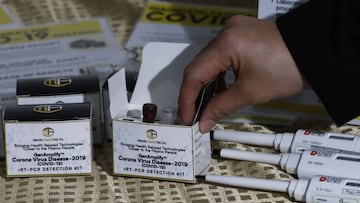Coranavirus: Spanish Covid-19 has mutated from original virus
A University of Valencia team has sequenced the coronanavirus for the first time in Spain, a breakthrough en route to a potential vaccine.

Studies carried out by the University of Valencia and the regional Foundation for Health and Biomedical Investigation, which resulted in the first sequences of the SARS-CoV2 virus obtained in Spain, have concluded that the coronavirus in Spain has mutated from the original outbreak in Wuhan.
Pathological studies carried out on three genome sequences of the SARS-CoV2 virus, which causes Covid-19, taken from the first patients to be diagnosed in Valencia show that the virus has had sufficient time after arriving in Europe to mutate and to become distinguishable from the original outbreak detected in China in January.
These kinds of investigation are expected to aid scientists in their work to produce a vaccine for the Covid-19 strand of the the coronavirus. As yet there is no time frame as to when such a vaccine may be ready although Dietmar Hopp, the owner of Bundesliga club Hoffenheim, is reported to be making progress through CureVac, a Tübingen-based company owned by the German billionaire that specialises in vaccines for contagious diseases.
Read also:
How long can coronavirus live in the human body?
Covid-19 symptoms: loss of sense of smell, taste added to list
Coranavirus mutations aid search for vaccine
Speaking to Spanish news outlet El Confidencial, Professor of Genetics at the University of Valencia, Fernando González, explained how the study was crucial to the global battle against the pandemic: "The genome of the virus is constantly mutating and it is precisely this that allows us to follow its trajectory across different countries and transmission chains. The patients in isolation in Valencia have displayed various mutations of the original virus sequenced in Wuhan. But that is normal: almost all of the viruses sequenced to date have presented some differences to the first. The most in one case, isolated in Brazil, has 16 mutations."
Applause could be heard across Spain and Italy yesterday as residents clapped from their windows to show gratitude to health workers on the coronavirus frontline👏
— BBC News (World) (@BBCWorld) March 15, 2020
The nationwide events were organised through social media to take place at the same timehttps://t.co/bROVgqPnI0 pic.twitter.com/1CCRwOnL6P
The next few weeks are expected to be crucial in preventing the worldwide spread of Covid-19 and understanding its transmission chains and capacity to mutate will help determine whether one vaccine will be sufficient to combat the virus or if it will continue to spread in a different form.
Related stories
The latest figures as of 17:00 (CET) 21 March place Covid-19 cases worldwide at more than 290,000 cases, with 11,953 deaths. Spain now has a total of 25,374 cases and 1,378 fatalities.
